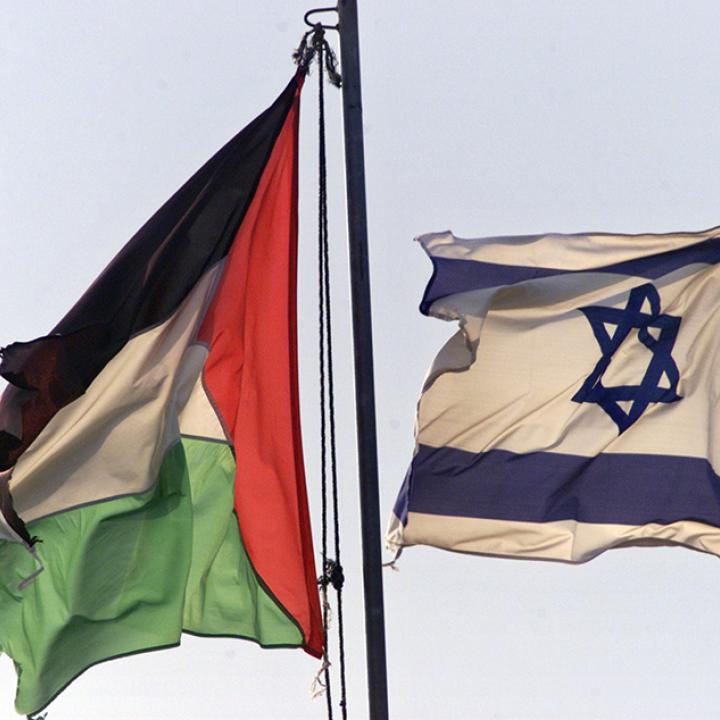
- Policy Analysis
- Fikra Forum
Palestinian Public Rejects Trump Plan But Prefers Calm, Practical Response

Three different Palestinian polls in the past few weeks indicate that the West Bank and Gaza publics roundly reject the U.S. administration’s peace plan by margins of around 90%. But the latest poll, conducted by the Palestine Center for Public Opinion (PCPO), also shows that most Palestinian respondents now also reject an armed confrontation or intifada against Israel—opting instead for a focus on pragmatic improvements on the ground, or even on renewed peace talks.
Plan refused, yet most Gazans want talks. In the latest poll by PCPO, completed February 11, 94% of West Bank respondents say they “categorically reject” the Trump plan. Interestingly, Gazan respondents are notably somewhat more moderate on this question, as they are on many other such issues. In Gaza, 70% reject the plan, but 20% want to “wait and see its details,” and the other 9% would accept it. Similarly, only one-third of Gazans—compared with two-thirds in the West Bank—now want to cut off all diplomatic contacts with the United States.
Majorities want calm, not confrontation. Moreover, rejection of this peace plan does not mean desire for violent confrontations. On the contrary, the majority of Palestinian respondents want Hamas to maintain a ceasefire with Israel: 56% of Gazans along with 69% of West Bankers reported supporting such a policy. And a mere 22% of West Bankers in the latest poll want to “escalate the resistance against Israel.” This figure is confirmed by a separate poll completed a week earlier and published by Birzeit University in the West Bank.
Why no intifada? The majority (55%) of West Bank respondents say one factor is that “many people are concerned about tough Palestinian Authority reactions to any disturbances.” This sentiment is echoed in a separate poll just released by Khalil Shikaki’s Palestinian Center for Policy and Survey Research, in which “73% anticipate that the PA leadership will not allow a resumption of armed struggle or an armed intifada.” Other calming factors identified by majorities in both the West Bank and Gaza include preoccupation with personal concerns, fear of Israeli retaliation, hope for outside support, dearth of trusted leaders, or even a preference for peaceful approaches.
This pragmatism is evident in other responses in the latest poll. Around 85% of Gazan respondents and 71% of West Bankers agree with the following statement: “Right now, internal political and economic reform is more important for us than any foreign policy issue.” More pointedly, 70% in both territories also agree with this seemingly provocative proposition: “Right now, the Palestinians should focus on practical matters like jobs, healthcare, education, and everyday stability, not on big political plans or resistance options.”
Economics first for Gaza. Prioritization of economic issues is particularly strong in Gaza, where the immediate needs are more pressing. Some 70% of Gazan respondents, compared with just 20% of West Bankers, say they want “Israeli companies to offer more jobs” in their area. In a similar vein, asked what they most want from the United States, 20% of Gazans pick more economic aid; a mere 9% of West Bankers say the same, with the majority preferring that the United States simply stay out of their affairs altogether.
Majorities expect peace talks after Israeli election. Looking ahead toward elections in both Israel and the United States offers one surprisingly encouraging finding. Nearly 60% of Palestinian respondents—whether in Gaza or the West Bank—say that “resumption of peace negotiations with a new Israeli government” is at least “fairly likely” after the March 2 vote. But expectations of the American election are more pessimistic. Only 22% in Gaza—and even fewer, a mere 9%, in the West Bank—think the outcome of the November U.S. election will make things “better for the Palestinians.”
Methodological notes. These findings are primarily from a survey conducted by the Palestine Center for Public Opinion, based in Beit Sahour in the West Bank, comprising face-to-face interviews among a representative sample of 500 West Bankers and 500 Gazans, January 23-February 11, 2020. That survey, sponsored by The Washington Institute, allowed for the author’s travel to the region to personally supervise its launch, helping ensure strict respondent confidentiality, technical proficiency, and quality controls. Additional methodological details are readily available on request.
Secondary findings are from two other, slightly earlier surveys. First, a separate poll conducted by the same local organization, January 31-February 5, 2020, among a representative sample of 1,255 Palestinians, and published by Birzeit University in the Maan Palestine News Agency on February 10. Second, a poll conducted and published by the Ramallah-based Palestinian Center for Policy and Survey Research, February 5-8, among a representative sample of 1,270 Palestinians. The margin of error for each of the three overall samples is approximately 3%.












